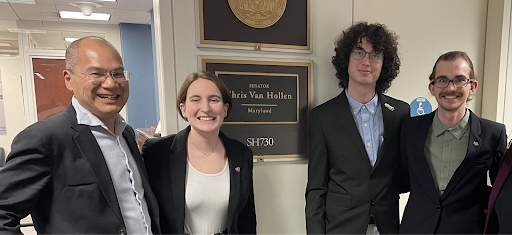By Dave Kung
In the two months since the inauguration, education – including mathematics education – has been under attack like never before. Postdocs have had their pay withheld, math research institutes have cancelled programs, math ed researchers have had their funding pulled, federal staff (including mathematicians) have been fired at NSF1, and now the Department of Education is being dismantled.
While courts have ruled that many of these actions were illegal, prompting some reversals, lawsuits take time – and they won’t put back together what’s been broken. (Teaching math as an act of resistance also takes time.) Many people across our community are confused and apprehensive about the intentional chaos going on in DC, trying to understand what it means for the teaching and learning of math, and looking for ways to fight back in the shorter term.
If that describes you, read on. (If not, read on anyway, to get more informed about what this chaos means for mathematics education.)
Impacts from firings and grant cancellations are immediate and obvious. The downstream effects of other hastily-made cuts are more subtle, especially the destruction of educational statistics and research at the Department of Education.
Since 1867, the National Center for Education Statistics has collected, analyzed, and reported data about students who are part of the sprawling US educational system, from preschool through to adult education. Now housed at the Department of Education, NCES sits under the Institute for Educational Sciences (IES). Both are part of an alphabet soup of efforts well known in policy circles, but only occasionally seen by the general public.
The National Assessment of Educational Progress (NAEP) is administered by NCES to a random sample of fourth and eighth graders in math and reading every year, issuing “the nation’s report card.” This year’s test revealed how students at the top are scoring at levels even with their pre-pandemic peers, while those at the bottom have yet to regain pandemic losses. K12 leaders across the country are planning interventions to address what this NAEP revealed. The future of this federally mandated test is in jeopardy now both because of staff reductions and because contracts for administering, analyzing, and disseminating the data have all been cancelled.
The National Center for Education Evaluation (NCEE) is an independent, non-partisan branch of IES, funding meticulously designed studies of educational innovations and using the results to inform the field. One such study evaluated an evidence-based professional development program in which math resource professionals were learning how to engage struggling students with foundational math concepts. The popular regional program had gained significant momentum and was showing promising results. Unfortunately nobody will be able to learn from this great work – with just 15% of its budget unspent, the entire project was cancelled as part of the supposed “cost cutting” measures2.
The Integrated Postsecondary Education Data System (IPEDS), run by NCES, gathers data from thousands of institutions on student progress. Want to know how many math or stats majors graduated from a particular institution? IPEDS will serve you up that info (instructions here), even breaking it down by race and gender. (An upcoming TPSE visualization will make access even easier.) An effort to align math options for high school seniors asked me to estimate the percent of all bachelors degree recipients that needed Calculus. For years I’ve been asking audiences to estimate this number, hearing anything from 5% to 80%. IPEDS is allowing me to pin down a number, helping state-reform efforts better meet students’ needs.
NCES’s data repositories help us understand how our system provides different opportunities to different students. Black students study Calculus in high school at about a third the rate of the overall population. How do we know? NCES data. Why? High schools that serve primarily white students are 54% more likely to offer Calculus than schools that predominantly serve students of color – a fact that comes from the government's Civil Rights Data Collection.
Most of what we know about education in the United States comes from data gathered by the Department of Education. In the last two months, the Department of Education has lost about half its staff; the group working on NCES has been reduced from about one hundred to just three. The latest executive order aims to close the Department completely, moving some core functions to other agencies.
Maybe losing all of these valuable resources makes you mad. Or maybe something else pushed your buttons: the cancelation of life-saving foreign aid, the erasure of trans people, the arrest of peaceful protestors, proposed ethnic cleansing in Gaza, or the creation of concentration camps for asylum-seeking migrants on US soil and elsewhere. Whichever issue is pushing your buttons, what should you do? What can you do?
In a recent TPSE webinar3 on the Disruption in DC, I talked with three leaders with deep knowledge of mathematics, the federal government, and relevant legal issues. They were unanimous that the most impactful thing each one of us can do is to contact our representatives in DC.
Let’s be honest, if you’ve never called or visited a member of Congress, it can be intimidating. While finding contact information is easy enough (click through and start typing your address) figuring out what to say is harder. When a hard-working, just-out-of-college staffer answers the phone, what should you say?
Here are a couple of tips:
- Focus on one particular issue (even if you have several on your mind).
- Introduce yourself and make it clear that you are a constituent (for example, saying where you live).
- Be explicit about how the issue impacts you and other constituents.
- If possible, have a specific ask. “I am asking Senator ____ to oppose the destruction of the Department of Education’s data-gathering branches.”
- Give the staffer time to take notes and ask for any clarifications before thanking them.
More impactful, if you are in the DC area, is an in-person visit. Several math organizations regularly organize Hill visits, including the MAA, AMS, AWM, and AMATYC. During a recent MAA conference in Alexandria, AMS’s Tyler Kloefkorn arranged for 29 visits by 19 of the attendees. I was paired with three energetic Towson University math majors in talking with Maryland Senator Chris Van Hollen’s office.

While we hope our conversation with a very supportive staffer gave the Senator more reasons to continue fighting the good fight, other attendees represented by Republicans likely had more impact, given the nature of partisan power in Congress.
In normal times, representatives typically hold town hall meetings in their districts, but it looks like that practice might not continue. In lieu of a visit or call, emailing your representatives is the next best thing. The AMS has made it incredibly easy to do this – it takes less than a minute to send a note using their Take Action tool.
Harvard education professor Andrew Ho describes what’s going on at the Department of Education as, “a five-alarm fire, burning statistics that we need to understand and improve education.” Protecting institutions is one of historian Timothy Snyder’s twenty lessons for fighting tyranny – drawn from his expertise as a historian of the early 20th century. Working together, we can help educate our representatives, as well as our friends, colleagues, and neighbors, about the important work being done by the Department of Education – and about the importance of education in general. No one person can put out a five-alarm five; it will take all of us working together.
Author’s Note: What do you think about what’s going on in Washington? How will changes at the Department of Education affect you and your work? Join the conversation at MAA Connect.

Dr. Dave Kung serves as Director of Transforming Post-Secondary Education in Math (TPSE-Math) and as a consultant as a mathematician without borders. He has worked in the intersection of mathematics and equity as the Director of Policy at the Charles A. Dana Center at The University of Texas at Austin, and as Director of MAA Project NExT. He also works closely with K-12 and higher ed organizations, especially concentrating on equity issues in mathematics. Kung was awarded the Deborah and Franklin Tepper Haimo Award, the MAA’s highest award in college math teaching, for his work at St. Mary’s College of Maryland. He resides in the DC area, playing violin and running–never simultaneously, but sometimes alongside his partner and daughter.
Follow Dave on LinkedIn or Bluesky
The views expressed in this column are Dave’s alone and do not represent those of any organizations he works with or for.
1 For transparency, this includes my partner, Adriana Salerno, whose story was beautifully told by her friend and fellow mathematician Ursula Whitcher.
2 Math tip for DOGE: canceling a $1,000 contract after most of it has been spent does not, in fact, save $1,000.
3 I serve as Executive Director of TPSE Math, though what I write on this site represents my own perspectives and not those of TPSE.
